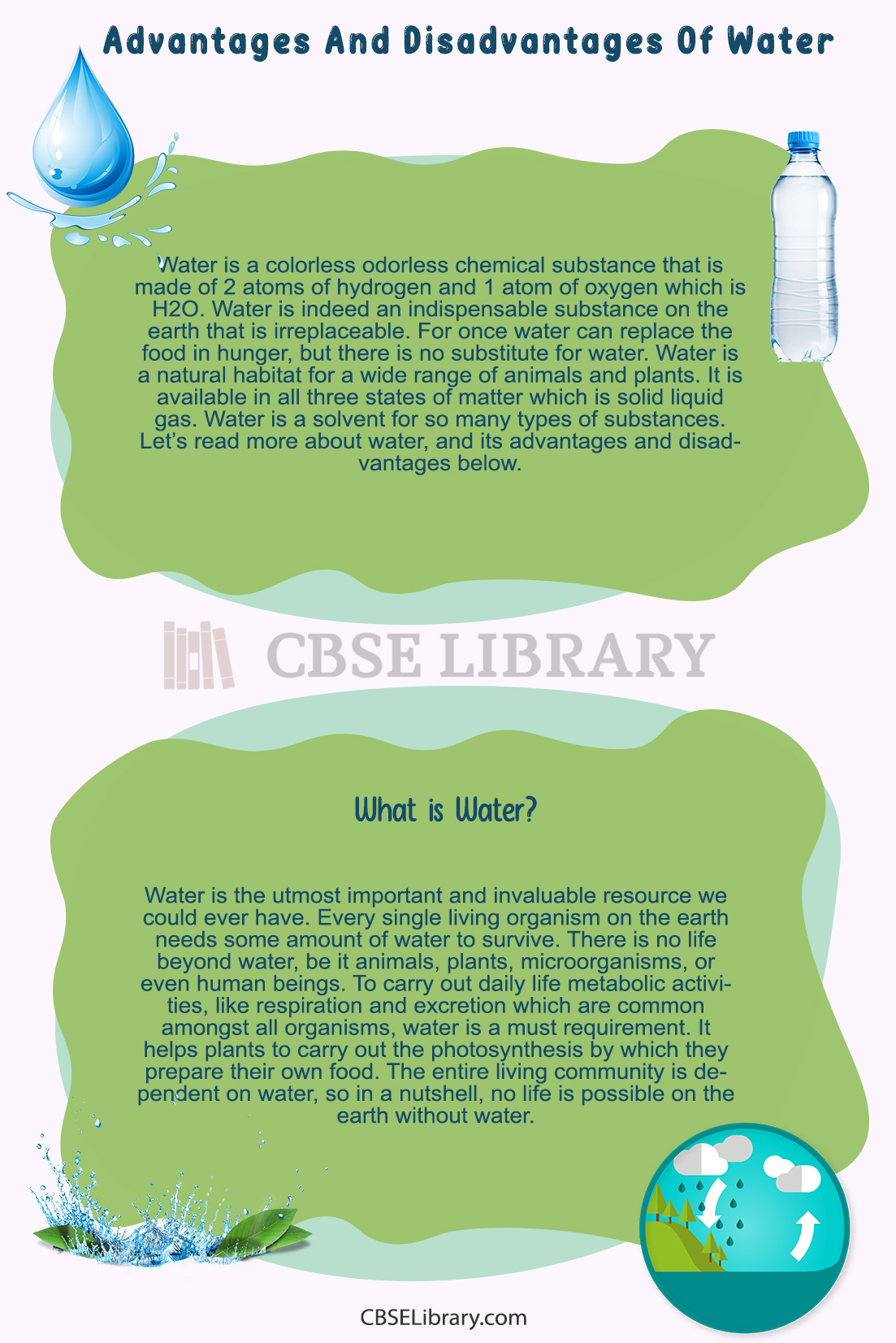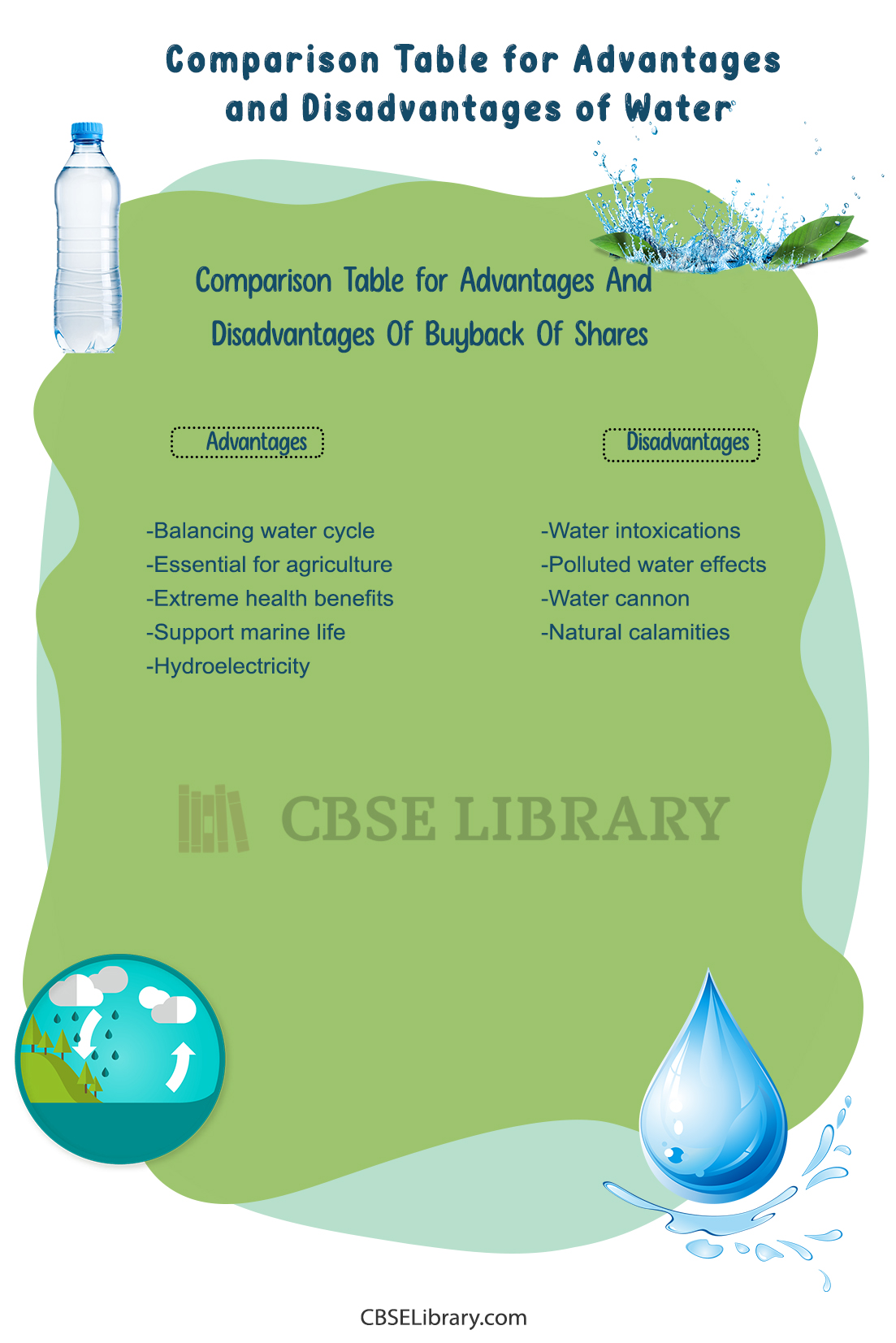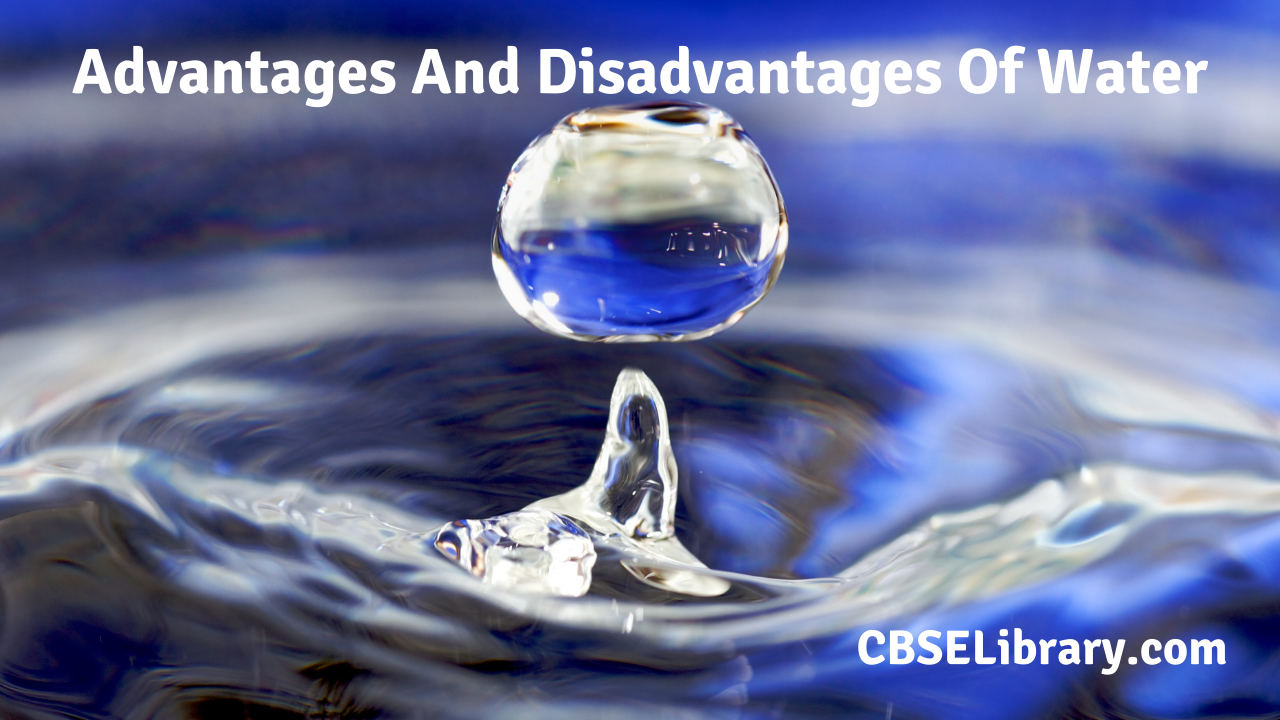Advantages And Disadvantages Of Water: Water is a colorless odorless chemical substance that is made of 2 atoms of hydrogen and 1 atom of oxygen which is H2O. Water is indeed an indispensable substance on the earth that is irreplaceable. For once water can replace the food in hunger, but there is no substitute for water. Water is a natural habitat for a wide range of animals and plants. It is available in all three states of matter which is solid liquid gas. Water is a solvent for so many types of substances. Let’s read more about water, and its advantages and disadvantages below.
Students can also find more Advantages and Disadvantages articles on events, persons, sports, technology, and many more.
What is Water? Advantages and Disadvantages of Water
Water is the utmost important and invaluable resource we could ever have. Every single living organism on the earth needs some amount of water to survive. There is no life beyond water, be it animals, plants, microorganisms, or even human beings. To carry out daily life metabolic activities, like respiration and excretion which are common amongst all organisms, water is a must requirement. It helps plants to carry out the photosynthesis by which they prepare their own food. The entire living community is dependent on water, so in a nutshell, no life is possible on the earth without water.
- Advantages of Water
- Disadvantages of Water
- Comparison Table for Advantages and Disadvantages of Water
- FAQ’s on Advantages And Disadvantages Of Water
Properties of Water
- Water is polar in Nature: Polarity means a condition in which the atom has positive and negative charges. Although, water is neutral in nature, still, it is affected by the negativity of the Oxygen and positivity of the Hydrogen. This is because of the bent shape where hydrogen atoms are present on one side of the molecule and oxygen atom is present on the other side.
- Excellent Solvent: Water is a universal solvent. The above-mentioned polar characteristic of water makes it the best and the universal solvent for most substances. When any substance is dissolved in water, the positive ions migrate toward oxygen, and the negative move towards the hydrogen, and hence dissolution happens.
- Density If Less In Liquid Form: The density of water in solid form is more than that in liquid form. When the water is solidified the temperature drop, which lowers the kinetic energy between the molecules between them. This results in increased proximity of the molecules and it becomes denser.
- Cohesive And Adhesive In Nature: Cohesion is the property in which the water gets attracted to the water and adhesion is the property in which water gets attracted to other substances. That is why when two water bodies meet at a junction, they become one. Also when water is put in some type of container, then it gets attached to it too.
- Boiling And Freezing Points: The boiling point refers to the specific temperature (100℃) at which the pressure exerted by the atmospheric pressure is equal to the pressure exerted by the water vapors and then at that point, the liquid starts to evaporate without raising the temperature. Whereas, at the freezing point (0℃) the liquid turns into solid.
Types of Water
Water can also be categorized into two types. The hard water and the soft water. Both of these types of water are easily available in our routine lives. The effects of the hardness and softness of water are seen in daily lives. Let’s take a look at the properties of both types of water.
- Hard Water: Hard water is a composition of different types of minerals, especially calcium and magnesium. The more amount of these minerals are present in the water, the more hard water becomes. Such type of water is not considered the best fit for usage in daily life. The hardness of the water can be identified by the following properties-
- Film of soap on hands after washing
- Stains on the utensils and clothes
- Shorter water flows through water pipes
- Leaves hands and skin dry
- Soft Water: Soft water, on the other hand, contains a relatively lesser and negligible amount of minerals. Soft water can be easily identified in the following ways-
- It created a rich lather on hands, dishes, and clothes
- There are no stains on any material washed with soft water
- Forceful or healthy pressure through pipes
- Neutral taste, or in some cases might give a taste of slight sodium, which is negligible.

Advantages of Water
- Helps In Balancing The Water Cycle: Water is the main and important role to play in a water cycle. When the water evaporates and condenses in the atmosphere, it precipitates back into the earth and increases the groundwater level.
- Water Is Essential For Agriculture: About 70-75% of freshwater is used in irrigation systems in agriculture. The main source of water for irrigation are rivers, groundwater, and reservoirs.
- Extreme Health Benefits: Drinking more and more water is always advisable. This is because the water helps in balancing the ions in the body, gears up the weight loss process, flushes out the intoxicants, and helps reduce stress and fatigue. Having lots of water improves the heart and kidney function too.
- Supports Marine Life: According to scientists, about 1 million species of aquatic animals. Aquatic animals breathe the oxygen dissolved in the water through their gills. Water is important for aquatic animals for maintaining health, regulating body temperature, nutrients, etc.
- Hydroelectricity: Electricity generated by water is widely used for domestic purposes. Since water is a non-conventional source of energy, hence the hydroelectric power stations depend on the water cycle for the generation of hydroelectricity.
Disadvantages of Water
- Water Intoxication: Although drinking water is advisable when too much water is consumed, the amount of water in the blood increases too much dilutes the electrolyte, and lowers the sodium level. This condition may lead to disruptions in the functioning of the brain.
- Polluted Water Effects: It is the human being, who pollutes the water to a greater level. As a result, this polluted water affects the living beings in numeral ways as it destructs the biodiversity, contaminates the food chain, life threat to the aquatic plants and animals, and can cause serious diseases to humans.
- Water Cannon: Water cannon is the most common type of weapon used by the police to disperse a big mob. But using water cannon in itself is disadvantageous in many ways as the latest propellors can throw up to 20 liters of water per second which is indeed a drastic waste of water.
- Natural Calamities: Too much of anything is harmful. The same applies to water also. Whenever a natural disaster is about to hit a strike, it makes most of its way from the water bodies making human and animal life miserable. The disasters of water include floods, cyclones, tsunamis, and earthquakes.
Comparison Table for Advantages and Disadvantages of Water
| Advantages | Disadvantages |
| Balancing water cycle | Water intoxications |
| Essential for agriculture | Polluted water effects |
| Extreme health benefits | Water cannon |
| Support marine life | Natural calamities |
| Hydroelectricity |

FAQ’s on Advantages And Disadvantages Of Water
Question 1.
Why is water important to live?
Answer:
It is a life-supporting natural substance on the earth. It is home to millions of species and helps in balancing the moisture requirement in the human body too.
Question 2.
What is the pH of water?
Answer:
Water is said to be neutral having a pH of 7 on the scale. We get the water from different sources and the pH varies slightly. However, all of the ranges are near the neutrality.
Question 3.
Who discovered water?
Answer:
Henry Cavendish was a natural philosopher who discovered water by combining hydrogen and oxygen atoms.
